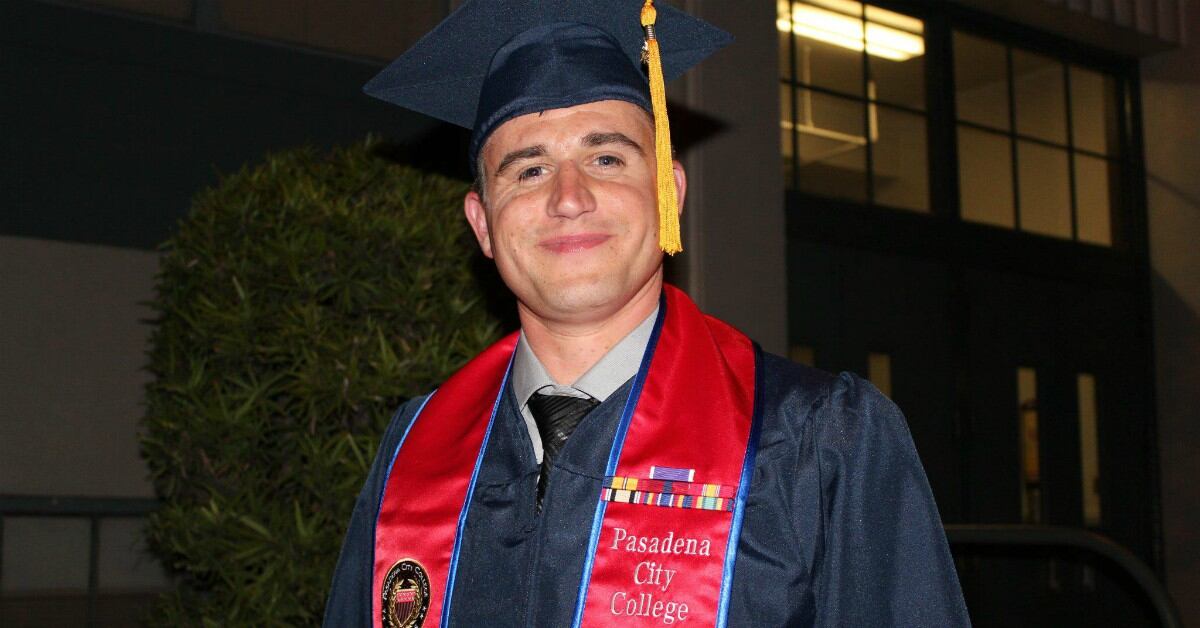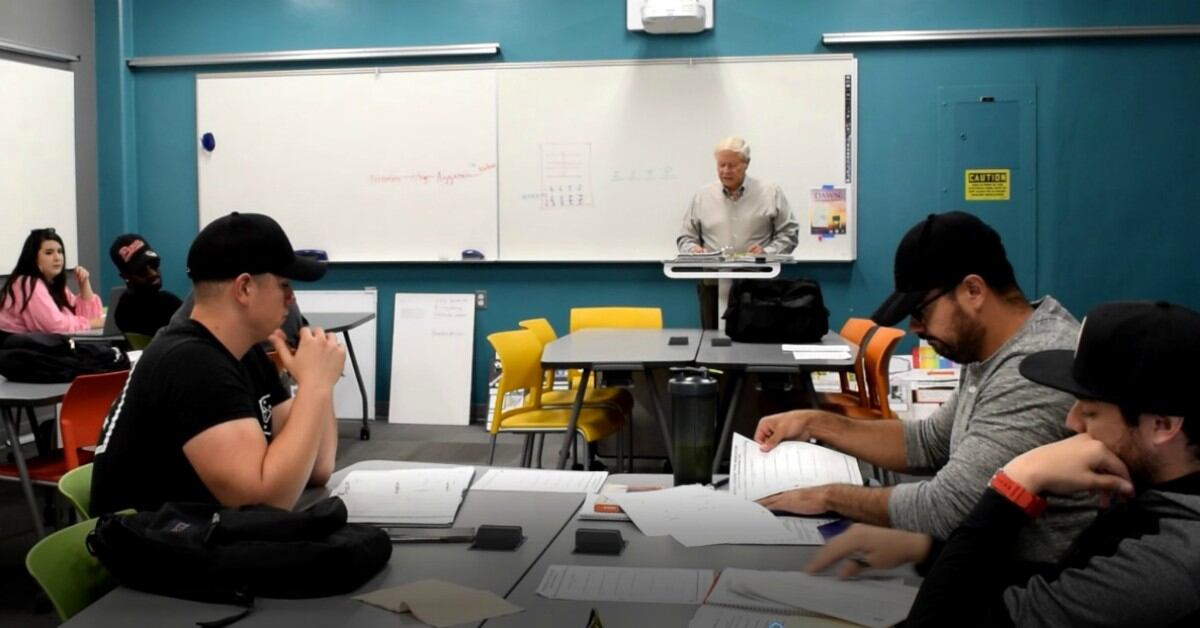PASADENA, Calif. — Nathan Kemnitz walked onto the campus of Pasadena City College wounded from war, fighting addiction and wondering whether enrolling in school was the best idea.
“I wasn’t really sure that I could do this,” the Marine veteran said in a recent interview on campus. “I was going to AA meetings when I got out here and lived in sober living with other guys, and so when I came here to the college, I was kind of raw.”
Kemnitz was dealing with physical disabilities and emotional trauma resulting from an IED blast in Fallujah, Afghanistan, that took the use of his right arm and eye. On top of that, he’d been out of school for nearly a decade and had forgotten how to write papers and add fractions, he said.
Then he found himself sitting in a first-year class called Boots to Books, a course designed to help veterans transition from military to civilian life. Part of a larger program that groups veterans into cohorts for their first semester of classes, the Boots to Books curriculum emphasizes skills needed to succeed in college, such as studying, writing and public speaking. The course even tackles more complex issues, such as anger management and post-traumatic stress.
The class helped Kemnitz develop study habits and better manage his time. Writing about his military experience and transition for assignments was also helpful, he said — as was learning from Professor Harold “Doc” Martin, a Vietnam veteran, who knew what it was like to transition out of the service.
That was seven years ago. Now, Kemnitz, 34, is a Ph.D. student in geological sciences at the University of Southern California, an accomplishment he credits to the Boots to Books program and PCC staff, who genuinely care about helping student veterans succeed, he said.
“If I just came to Pasadena City College just as a veteran off the street and didn’t get involved with a cohort, I might have made it, but I would not have exceeded or gone as far as I have today,” he said.
A 'moral obligation’
For years, the California Community College System has been one of the top enrollers of students using the Post-9/11 GI Bill to pay for school. With just 313 of the system’s 18,500 GI Bill students, according to federal data from last fiscal year, PCC’s veteran enrollment is still more than 13 times what it was less than a decade ago.
“It was a real wake-up call for us,” said Patty D’Orange-Martin, coordinator of veterans services at the college. So when a fellow community college that had developed Boots to Books asked them if they wanted in, the school quickly adopted the course.
PCC is now passing on what they’ve learned to other California schools looking to start a similar program.
“We were not tasked with the mission to help these veterans transition, but now that they’re here, it’s a moral obligation,” said D’Orange-Martin. “They gave up four years or more of their lives. Some of them were hurt very badly. Others had a wonderful experience but are having a little bit of problems transitioning out and becoming a citizen back again rather than being a military member. So, it really is an obligation for us, as a state, to help these young men and women to get back to being a productive citizen within our society, rather than sort of being another lost generation like the Vietnam veterans.”
PCC veterans are about as nontraditional as students come. About a quarter have seen combat, 25 percent have families and about 65 percent are disabled, D’Orange-Martin said. Some students come straight to school after the military, with only a few days’ break.

Professor Martin, who leads the Boots to Books program, tries to create an atmosphere in class that replicates the camaraderie of active duty. The class includes a three-day camping trip and is generally “much freer and looser” and more of a community than the students experience in other classes, where veterans are much older than their 18- to 20-year-old classmates, he said.
“When they're done with this class, they usually dovetail right into the veterans club, where they continue these friendships,” Martin said. “I find out that they're studying together. They're spending time in the weekends together. And this is where they're connecting with other students.”
Boots to Books was developed in 2007 as the nation’s first college credit-bearing course to assist veterans returning from Iraq and Afghanistan, according to the California Community Colleges website. The course is now offered at approximately 20 community colleges throughout the system.
Elsewhere, colleges and universities across the country have rolled out similar offerings.
Georgia Southern University’s approach is called Combat to Classroom. West Virginia University offers a course based on the book, “The Transitioning Veteran in Higher Education,” and at the University of Wyoming, veterans can enroll in a three-credit class that draws on students’ military experiences to enhance their communication skills, according to schools’ responses to a recent Military Times survey.
The University of Wisconsin-Superior’s new military-to-civilian transition course was launched nearly a year ago, to help boost the school’s 36 percent veteran graduation rate. Monte Stewart, coordinator of the school’s Veteran and Nontraditional Student Center, said in an email that all of the students who took the fall 2017 class returned to the school for the spring semester, perhaps an early indicator of success.
“We’re very hopeful that this course can have a long-term impact on our student veterans,” he said.

More than academics
The feedback and anecdotal evidence about the impact of the Boots to Books class at PCC is strong, said D’Orange-Martin. But it’s not a “fix-all,” she said, and even after doing it for 10 years, it’s difficult to measure Boots to Books’ success with hard data. While student veteran retention rates at the school are high, many struggle academically.
“When I looked at the statistics, they weren’t all as glowing as I would’ve wanted,” she said.
But then she read the essays students turned in at the end of the semester.
“Many of them said that if it hadn't been for this class, it hadn't been for the program, that they don't know if they'd still be here,” she said. “Some of them actually said that they would have committed suicide because they felt so alienated before they took the class. And others said that this was the best class and the best program they could have been in because it really helped them reconnect with that civilian world…. So when you look at it from that perspective in a more holistic viewpoint, it is very successful.”
Kemnitz is a shining example.
“I would have kind of just been lost in the crowd,” he said. “I still would have been dealing, maybe, with all the crap that was going on inside of me.”
Military Times contributor and former reporter Natalie Gross hosts the Spouse Angle podcast. She grew up in a military family and has a master's degree in journalism from Georgetown University.




